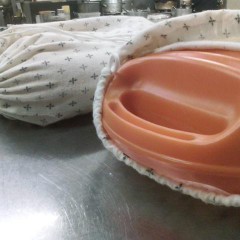日本の湯たんぽはものすごく良い発想だと思います。夜、寝る前に、お風呂に入る時に、お風呂のお湯を湯たんぽに入れてベッドまで持って行くと。そしたら夜はほかほかで寝れる。
特に温泉の場合、お湯はかけ流しですから、湯たんぽを使って他の暖房を使わなくてすむなら環境に優しい。
この亀清旅館で、冬の間はお客様が自由に使えれるように湯たんぽをお風呂場の前に置きます。この頃、夜の温度が零℃以下になりました。従って、また湯たんぽの出番。
ちなみに、うちの父親のお父さんはアイルランドからアメリカに移民したそうです。話によると、そのおじさんが子供のころ、海沿いの石作りの民家で育たれた。冬は毎朝、自分の石を暖炉の前に置く習慣だったそうです。そして、夜は暖炉で暖めた石をベッドに持って行って、抱っこしながら寝たって。朝は石を暖炉に運ぶのを忘れたら、夜は寒くて眠れなかったと言う。
湯たんぽの事でその話を思い出した美した。
Japan's 'yutampo' is a great idea. At night, before going to bed, when you take your bath you fill up the yutampo hot water cannister then take it to bed with you. It keeps you toasty warm as you go to sleep.
Especially when your bath is an onsen like here at Kamesei, using the natural hot spring water instead of fossil fuels for heat, it's beneficial for the environment.
At Kamesei, during the winter months we put yutampos out by the entrance to the baths for our guests to use as they please. And as the night-time temperatures have been dipping below freezing lately, the yutampo have once again made their appearance.
By the way, my dad's father immigrated to the States from Ireland. He grew up in an old stone farmhouse on the Atlantic coast, in a town called 'Tonregee'. I was told it was Gaelic for 'Turn your ass' in reference to the winter gales blowing in from the Atlantic. Apparently they are so strong that if you don't turn your ass to them, you'd get blown away.
Anyways, in the winter every one in the family took a stone and placed it in front of the hearth. Then at night, they took their stone with them to bed to keep them warm at night. If they forgot to put their stone by the hearth in the morning, they had to deal with a brutally cold night.
As the yutampo came out, it reminded me of that story about my grandfather.




